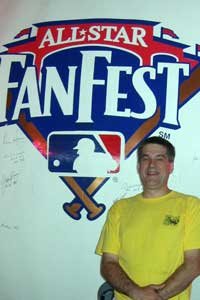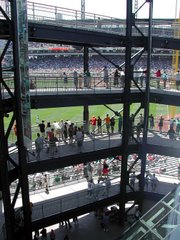Pittsburgh attorney Sam Reich has written a book, "Waiting for Cooperstown," that provides a thorough analysis of the qualifications for many would-be inductees. He concentrates mainly on players he knew during his formative years, with those playing the bulk of their careers after 1972 not considered. (As he explained at Saturday's meeting of the Forbes Field chapter of the Society for American Baseball Research, he considers the advent of the designated hitter rule in '73 as the start of a new era, so he drew the line there.)
He offers 10 leading candidates for enshrinement:

Ron Santo (The Associated Press)
1. Ron Santo. The former Cubs third baseman has come close to election by the Veterans Committee, although that particular body has not given anyone the nod in recent years. Santo was the premier player at his position during the 1960s and into the early '80s, but he might be overshadowed by three teammates in the Hall of Fame: Ernie Banks, Billy Williams and Ferguson Jenkins.
2. Maury Wills. This seemed like a no-brainer after Wills broke Ty Cobb's single-season stolen base record and helped propel a hitting-challenged Dodgers team to three pennants during the '60s. But after Lou Brock displaced him in the record book, Wills was somewhat of a forgotten man. Reich contends that Wills' base running transformed the game from its relatively static version in the '50s to a more exciting brand of baseball the following decade.
3. Gil Hodges. A certified star for the Brooklyn Dodgers, Hodges also showed a penchant for managing, guiding the 1969 New York Mets to their "miracle" championship. Unfortunately, he suffered a fatal heart attack just before the 1972 season. Who knows what might have been.
4. Allie Reynolds. The ace of the Yankees pitching staff during the team's five-year run of championships in 1949-53, Reynolds was especially clutch in the World Series. Hurting the cause of "Superchief" is his lifetime win total of 182, although he compiled a superior .630 lifetime winning percentage.
5. Joe Gordon. Recognized as the American League's top second baseman during much of his career, Gordon belted 253 home runs in just 11 seasons, a very impressive total for the time, particularly for a middle infielder. Like Reynolds, Gordon might also suffer from the presence of so many Yankees in the Hall of Fame already.
6. Stan Hack. Relatively few third basemen are enshrined in the Hall of Fame. For whatever reason, not many superstars played the position until the days of Robinson, Schmidt and Brett (and Santo). While with the Cubs in the '30s and '40s, Hack was probably the top third baseman in his league, receiving MVP votes in eight consecutive seasons and hitting .323 in 1945, the year of Chicago's last World Series appearance to date.
7. Jim Kaat. Four pitchers who won 250 or more games are not in the Hall of Fame: Kaat, Bert Blyleven, Tommy John and Jack Morris. In Kaat's case, he never was considered one of the top pitchers in the game, and most fans remember him simply as a soft-tossing lefty. Kaat should be given points for longevity: He played from 1959 through 1983 and was the last active original Washington Senator. He also won 16 consecutive Gold Glove awards.
8. Bob Johnson. Perhaps the most obscure player on Reich's list, "Indian Bob" spent most of his career with the Philadelphia Athletics at a time when the A's were so awful that no one paid any attention. Johnson cracked 20 or more home runs in each of his first nine seasons (1933-41), which was a tremendous accomplishment for that period. Back when I started following baseball, his 288 homers used to show up on the career leaders list. And he hit a healthy .296, to boot.
9. Vern Stephens. My assumption is that the case against Stephens involves spending the first several years of his career with the St. Louis Browns, another team that garnered very little attention. But the Browns did win the American League pennant in 1944, and Stephens was their starting shortstop. And he led the league in runs batted in that year. Speaking of RBI, Stephens made a specialty of it when he was traded to the Red Sox, batting in 440 runs in a three-year span (1948-50).
10. Wes Ferrell. Two factors weigh heavily against Ferrell: He won 193 games, and in his era, 200 was considered the benchmark for Hall of Fame pitchers. And his career earned run average was 4.04, higher than any pitcher now enshrined. Ferrell won 20 or more games in each of his first four full seasons, but his arm had pretty much given out on him by the time he was 40.
It is the contention of some historians that Ferrell could have been a Hall of Famer as a hitter. He hit 38 home runs for his career, a record for pitchers. Nine of them came in one season, another record for pitchers. And in another season, he drove in 32 runs for yet another pitchers' record.
His brother, Rick Ferrell, was a catcher. He hit 28 career home runs, and his season high was eight.
Yet Rick Ferrell is one of those guys whom the Veterans Committee elected to the Hall of Fame.









No comments:
Post a Comment